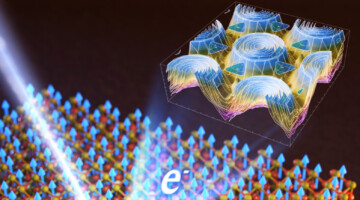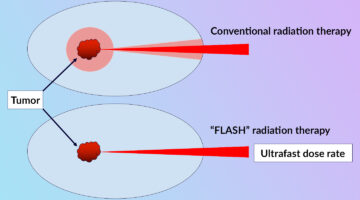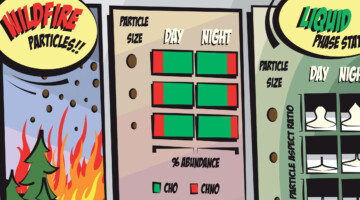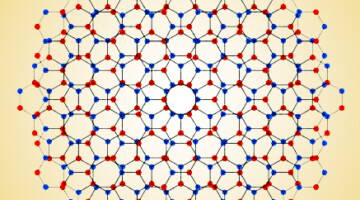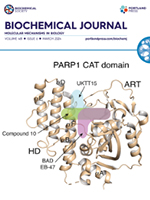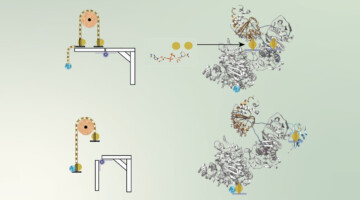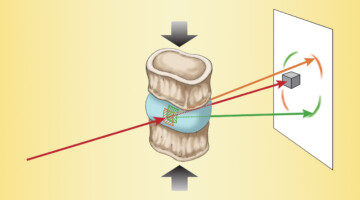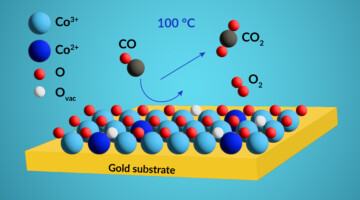Exactly how does coral make its skeleton, a sea urchin grow a spine, or an abalone form the mother-of-pearl in its shell? A new study at the ALS revealed that this process of biomineralization, which sea creatures use to lock carbon away in their bodies, is more complex and diverse than previously thought. Read more »
Room-Temperature 2D Magnet: Electronic-Structure Insights
Researchers found that small changes in how electron spins interact with each other can make a big difference in the magnetic transition temperatures of 2D magnets. Understanding such factors can help create better magnetic materials for information storage, sensors, medical imaging, and energy-efficient computing. Read more »![]()
![]()
Clarifying the FLASH Effect for Cancer Radiation Therapy
To clarify the underlying mechanisms of the FLASH effect, in which the delivery of ultrafast, high-intensity doses of radiation to tumors counterintuitively reduces damage to surrounding healthy cells, researchers directly compared the oxidative effects of conventional and FLASH techniques using x-ray footprinting at the ALS. Read more »
Case Study of Aerosol Particles Influenced by Wildfire
Researchers studied atmospheric aerosols influenced by wildfires in the Pacific Northwest. They examined the connection between particle size, chemical composition, and phase state, in particles collected during the day and at night. The information is important for modeling the effects of wildfire smoke on atmospheric properties. Read more »
ALS in the News (March 2024)
Big Twist Leads to Tunable Energy Gaps in a Bilayer Stack
Researchers found that twisting 2D layers at atypically large angles opens up potentially useful energy gaps in the material’s band structure. The results suggest a new way to tune materials for optoelectronic applications and provide a platform for exploring novel “moiré” phenomena beyond those observed at small twist angles. Read more »![]()
![]()
Novel modifications of PARP inhibitor veliparib increase PARP1 binding to DNA breaks
The catalytic activity of PARP1 is associated with DNA damage detection and repair among other cellular functions. We describe efforts to modify the allosteric properties of veliparib, a potent catalytic inhibitor of PARP1. These compounds highlight a unique way to trigger PARP1 retention on DNA breaks and open a path to unveil the pharmacological benefits of such inhibitors with novel properties. Read more »
Bifurcation of High- and Low-Energy Electrons in Microbial Metabolism
A class of chemical reaction found only in biology, electron bifurcation channels two electrons from one donor to two separate acceptors, with one electron elevated in energy at the expense of lowering the energy of the second. Researchers used the ALS to study this process in a microbial protein involved in this bioenergetic pathway. Read more »
The Effects of Diabetes on Spinal-Column Biomechanics
Researchers found that type 2 diabetes induces earlier onset of plastic (nonrecoverable) deformation in intervertebral discs by impairing the biomechanical behavior of collagen. A greater understanding of the underlying causes of tissue failure in diabetes—a growing problem worldwide—is important in helping to prevent and treat symptoms. Read more »![]()
Probing Active-Site Chemical States in a Co-Based Catalyst
Researchers identified the dominant chemical state of active sites in a cobalt-based catalyst using resonant photoemission spectroscopy under realistic conditions. The work will help scientists develop more-efficient catalysts for removing noxious carbon monoxide gas from exhaust streams generated by the burning of fossil fuels. Read more »![]()
![]()
- « Previous Page
- 1
- …
- 7
- 8
- 9
- 10
- 11
- …
- 83
- Next Page »

